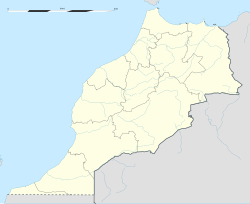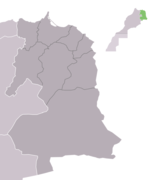Berkane: Difference between revisions
Please expand |
No edit summary |
||
| Line 1: | Line 1: | ||
{{Infobox settlement |
{{Infobox settlement |
||
<!--See the Table at Infobox Settlement for all fields and descriptions of usage--> |
<!--See the Table at Infobox Settlement for all fields and descriptions of usage--> |
||
<!-- Basic info ----------------> |
<!-- Basic info ---------------->| settlement_type = City |
||
| ⚫ | |||
| |
| nickname = Orange city |
||
| ⚫ | |||
| |
| motto = <!-- images and maps -----------> |
||
| |
| image_skyline = {{Photomontage |
||
| image_skyline = {{Photomontage |
|||
| photo1a = Préfecture de la Province de Berkane - Pasc5.jpg |
| photo1a = Préfecture de la Province de Berkane - Pasc5.jpg |
||
| photo2a = Institut Spécialisé de Technologie Appliquée Berkane.JPG |
| photo2a = Institut Spécialisé de Technologie Appliquée Berkane.JPG |
||
| Line 16: | Line 15: | ||
| border = 0 |
| border = 0 |
||
}} |
}} |
||
| imagesize |
| imagesize = 250px |
||
| image_caption |
| image_caption = ''The clementine'', sculpture in the city centre of Berkane |
||
| image_flag |
| image_flag = |
||
| flag_size |
| flag_size = |
||
| image_seal |
| image_seal = |
||
| seal_size |
| seal_size = |
||
| image_shield |
| image_shield = |
||
| shield_size |
| shield_size = |
||
|pushpin_map = Morocco |
| pushpin_map = Morocco |
||
<!-- Location ------------------>| subdivision_type |
<!-- Location ------------------>| subdivision_type = Country |
||
| subdivision_name |
| subdivision_name = {{MAR}} |
||
| subdivision_type1 |
| subdivision_type1 = [[Regions of Morocco|Region]] |
||
| subdivision_name1 |
| subdivision_name1 = [[Oriental (Morocco)|Oriental]] |
||
| subdivision_type2 |
| subdivision_type2 = [[Provinces of Morocco|Province]] |
||
| subdivision_name2 |
| subdivision_name2 = [[Berkane Province|Berkane]] |
||
| subdivision_type3 |
| subdivision_type3 = |
||
| subdivision_name3 |
| subdivision_name3 = |<!-- Politics -----------------> |
||
| government_footnotes |
| government_footnotes = |
||
| government_type |
| government_type = |
||
| leader_title |
| leader_title = |
||
| leader_name |
| leader_name = |
||
| leader_title1 |
| leader_title1 = <!-- for places with, say, both a mayor and a city manager --> |
||
| leader_name1 |
| leader_name1 = |
||
| established_title |
| established_title = <!-- Settled --> |
||
| established_date |
| established_date = <!-- Area ---------------------> |
||
| area_magnitude |
| area_magnitude = |
||
| area_footnotes |
| area_footnotes = |
||
| area_total_km2 |
| area_total_km2 = <!-- ALL fields dealing with a measurements are subject to automatic unit conversion--> |
||
| area_land_km2 |
| area_land_km2 = <!--See table @ Template:Infobox Settlement for details on automatic unit conversion--> |
||
<!-- Population -----------------------> |
<!-- Population ----------------------->| population_as_of = 2014 |
||
| ⚫ | | population_footnotes = <ref name=census2014>{{cite web |url=http://rgph2014.hcp.ma/file/166326/ |title=POPULATION LÉGALE DES RÉGIONS, PROVINCES, PRÉFECTURES, MUNICIPALITÉS, ARRONDISSEMENTS ET COMMUNES DU ROYAUME D’APRÈS LES RÉSULTATS DU RGPH 2014 |language=ar, fr |publisher=[[Haut Commissariat au Plan|High Commission for Planning, Morocco]] |date=8 April 2015 |access-date=29 September 2017}}</ref> |
||
| population_as_of = 2014 |
|||
| population_note = |
|||
| ⚫ | | population_footnotes |
||
| |
| population_total = 109237 |
||
| ⚫ | |||
| population_total = 109237 |
|||
| population_density_sq_mi = |
|||
| ⚫ | |||
| |
| population_metro = |
||
| ⚫ | |||
| population_metro = |
|||
| ⚫ | |||
| ⚫ | |||
| population_blank1_title = Ethnicities |
|||
| ⚫ | |||
| |
| population_blank1 = |
||
| ⚫ | |||
| population_blank1 = |
|||
| ⚫ | |||
| population_density_blank1_sq_mi = <!-- General information ---------------> |
| population_density_blank1_sq_mi = <!-- General information ---------------> |
||
| |
| utc_offset = +1 |
||
| |
| coordinates = {{coord|34|55|N|2|19|W|region:MA|display=inline}} |
||
| elevation_footnotes = <!--for references: use <ref> </ref> tags--> |
|||
| coordinates = {{coord|34|55|N|2|19|W|region:MA|display=inline}} |
|||
| |
| elevation_m = |
||
| |
| elevation_ft = <!-- Area/postal codes & others --------> |
||
| postal_code_type = Postal code |
|||
| elevation_ft = <!-- Area/postal codes & others --------> |
|||
| |
| postal_code = 63300 |
||
| |
| area_code = |
||
| |
| website = |
||
| |
| footnotes = |
||
| |
| official_name = Berkane |
||
| official_name = Berkane |
|||
}} |
}} |
||
'''Berkane''' ({{ |
'''Berkane''' ({{Lang-ar|بركان}}) is a city in northeastern [[Morocco]], limited by the Mediterranean to the north, the Kis river (Moroccan-[[Algeria]]n border) and [[Oujda Province]] in the east, [[Nador Province]] to the west, and [[Taourirt Province]] in the south. It is the capital of [[Berkane Province]]. |
||
==Population== |
==Population== |
||
The city recorded a population of 109,237 in the [[2014 Moroccan census]].<ref name="census2014" /> The |
The city recorded a population of 109,237 in the [[2014 Moroccan census]].<ref name="census2014" /> The eastern dialect of [[Moroccan Arabic]] is spoken by most citizens, although [[Berber languages|Berber]] is also spoken by some people. |
||
According to the last official census, the population of the Berkane region will reach a total of 289,137 people, that is, an estimated 12.5 percent of the population of the eastern region, with a high density of 145.7 people per square kilometer compared to 25.7 people per square kilometer in relation to the region. With a high [[urbanization]] rate of 63.2 percent. |
According to the last official census, the population of the Berkane region will reach a total of 289,137 people, that is, an estimated 12.5 percent of the population of the eastern region, with a high density of 145.7 people per square kilometer compared to 25.7 people per square kilometer in relation to the region. With a high [[urbanization]] rate of 63.2 percent. |
||
===Historic population=== |
===Historic population=== |
||
As the population moved from 368 people in 1917 to 3,600 people in 1936 and then doubled in 1947, it reached 7,545 people, then it jumped to 20,496 people in 1960, then to 60,490 people in 1982 and 77,026 in 1994. In the year 1996, the city's population was estimated at 82,000 people. |
As the population moved from 368 people in 1917 to 3,600 people in 1936 and then doubled in 1947, it reached 7,545 people, then it jumped to 20,496 people in 1960, then to 60,490 people in 1982 and 77,026 in 1994. In the year 1996, the city's population was estimated at 82,000 people.{{Cn|date=August 2022}} |
||
==Etymology== |
==Etymology== |
||
The city takes its name from the patron saint of the city, Sidi Ahmad Aberkane (who died in [[Islamic calendar|868]] of the [[Islamic calendar]]). |
The city takes its name from the patron saint of the city, Sidi Ahmad Aberkane (who died in [[Islamic calendar|868]] of the [[Islamic calendar]]).{{Cn|date=August 2022}} |
||
[[File:Sidi Ahmed Aberkane.jpg|thumb|left|The Mausoleum of Sidi Ahmad Aberkane in Berkane, Morocco.]] |
[[File:Sidi Ahmed Aberkane.jpg|thumb|left|The Mausoleum of Sidi Ahmad Aberkane in Berkane, Morocco.]] |
||
Revision as of 16:40, 23 August 2022
Berkane
بركان | |
|---|---|
City | |
The clementine, sculpture in the city centre of Berkane | |
| Nickname: Orange city | |
| Coordinates: 34°55′N 2°19′W / 34.917°N 2.317°W | |
| Country | |
| Region | Oriental |
| Province | Berkane |
| Population (2014)[1] | |
• Total | 109,237 |
| Time zone | UTC+1 |
| Postal code | 63300 |
Berkane (Template:Lang-ar) is a city in northeastern Morocco, limited by the Mediterranean to the north, the Kis river (Moroccan-Algerian border) and Oujda Province in the east, Nador Province to the west, and Taourirt Province in the south. It is the capital of Berkane Province.
Population
The city recorded a population of 109,237 in the 2014 Moroccan census.[1] The eastern dialect of Moroccan Arabic is spoken by most citizens, although Berber is also spoken by some people.
According to the last official census, the population of the Berkane region will reach a total of 289,137 people, that is, an estimated 12.5 percent of the population of the eastern region, with a high density of 145.7 people per square kilometer compared to 25.7 people per square kilometer in relation to the region. With a high urbanization rate of 63.2 percent.
Historic population
As the population moved from 368 people in 1917 to 3,600 people in 1936 and then doubled in 1947, it reached 7,545 people, then it jumped to 20,496 people in 1960, then to 60,490 people in 1982 and 77,026 in 1994. In the year 1996, the city's population was estimated at 82,000 people.[citation needed]
Etymology
The city takes its name from the patron saint of the city, Sidi Ahmad Aberkane (who died in 868 of the Islamic calendar).[citation needed]

Recent city
The city of Berkane is considered a agricultural city as a result of the irrigation policy that colonialism followed, starting in the middle of the first half of the twentieth century, in the major irrigated circles. Especially since it is located on one of the richest plains in Morocco, the Tarifa plain.
The emergence of Berkane as a city, and its development, was linked to the local agricultural wealth. However the administrative leadership of the fledgling city, which abolished the old political entities of the Aït Iznasen tribes, was behind the French political decision in the colonial period to assign the role of direct leadership to Berkane over the neighboring tribes. The development of the agricultural economy and the improvement of the standard of living in the city have contributed to emptying the tribes from their population and displacing the human weight from the mountain fortress to the open plain and facilitated the process of military control of the French occupation of the region. The massive influx of workers in the agriculture sector from different Moroccan regions has also disrupted the homogeneous tribal fabric.
Economy
Berkane is considered the capital of the citrus fruit industry of Morocco, and high-quality fresh fruit and vegetables are plentiful year round. It is known for its farms of clementines. Also, a large statue of an orange is at the center of town. It is very close to Saïdia, a popular beach resort town on the Mediterranean, as well as Tafoughalt, a small village in the nearby mountains known for its healthy air and herb markets.
Berkane is also a commercial and business strip. Ibn Sina/Rue Dehb or Alhob (meaning "The Street of Gold" or "Street of Love") is lined with many of the most popular cafes and jewelry shops. The city sprawls into the hillsides and connects via bridge to a small neighboring town, Sidi Slimane, giving the impression that it is much larger than the census claims.
Notable people
- Hicham El Guerrouj, Former olympic athlete, world record holder for the fastest mile.
- Mohammed Hendouf, Moroccan-Belgian kickboxer.
- Abdelkader El Brazi, Former international goalkeeper
- Aziz Bouhaddouz, International footballer
Twin towns – sister cities
 Bondy, France
Bondy, France Perpignan, France
Perpignan, France Saint-Gilles, Belgium
Saint-Gilles, Belgium Zeist, Netherlands
Zeist, Netherlands
References
- ^ a b "POPULATION LÉGALE DES RÉGIONS, PROVINCES, PRÉFECTURES, MUNICIPALITÉS, ARRONDISSEMENTS ET COMMUNES DU ROYAUME D'APRÈS LES RÉSULTATS DU RGPH 2014" (in Arabic and French). High Commission for Planning, Morocco. 8 April 2015. Retrieved 29 September 2017.
- ^ "L'intégration régionaleet locale du volet migration et développement au Maroc" (PDF). oriental.ma (in French). Initiative Conjointe pour la Migration et le Développement. 2013. p. 86. Retrieved 2020-12-02.
External links
![]() Media related to Berkane at Wikimedia Commons
Media related to Berkane at Wikimedia Commons






